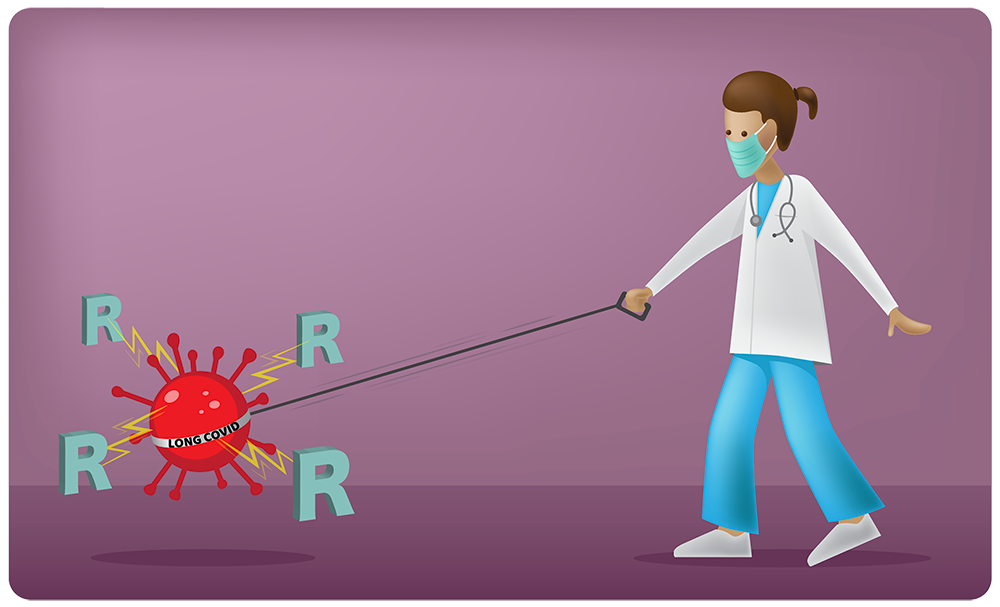Athletes and Post-COVID-19 condition
For more than a year now the whole world has been fighting the COVID-19 crisis. WHO declared a pandemic on March 11 and it is still ongoing. The great hope is in massive vaccination but the real end is still not clear. What seemed a “simple” respiratory infection at the beginning soon revealed its complex and diverse nature. COVID 19 is a multi-system disease with common prolonged forms.[1]
Long COVID – patient-made disease
Several months after the coronavirus outbreak, patients, which connected through social media, came up with ‘Long COVID’, so their lasting and various symptoms could be acknowledged.[2] The literature now recognises more than 200 different symptoms in 10 organ systems associated with, what WHO calls post-COVID-19 condition. [3,4] The proposed aetiology is a dysfunctional immune-inflammatory response. [5]
While some authors define Long COVID as a syndrome due to its multisystem affection, Prof. Greenhalgh et al. focus their terminology on the time that takes for symptoms to resolve:
- 3-12 weeks – post-acute
- more than 12 weeks – chronic.[6]
The precise terminology is yet to come as the science needs to answer more important questions.
The World Health Organization has recently highlighted the importance of adequate Long COVID rehabilitation and suggested more systematic research on COVID 19 health consequences.[4] In this global effort the sport community should not be excluded.
Athletes and Long COVID
Many athletes were infected during the coronavirus pandemic, but the extent of Long COVID symptoms among them are not known. The sports and exercise medicine professionals should be able to recognize possible “long haulers” among athletes. Approximately 20% of non-hospitalized COVID-19 patients had long-COVID symptoms – indicating that healthy individuals with mild clinical presentation can develop long-lasting symptoms.[3,4] Many patients fight persistent symptoms for more than 7 months.[3] Some of the most commonly reported are fatigue, post-extensional malaise, depression, sleep disorders, autonomic dysfunction and they shouldn’t be mistaken for overtraining or relative energy deficiency syndrom in athletes. RTP should be adjusted, re-evaluated and individualized with a multidisciplinary decision making model.
Preliminary data and available guidelines suggest that the general practitioners (GP) are the doctors of choice for “long haulers”.[5,7] This growing group of patients requires holistic approach with accessible multidisciplinary care.[8] Sports and exercise doctors like their GP colleges are capable to understand and offer individualised multidisciplinary rehabilitation model.
WHO’s director general, Tedros Ghebreyesus, stated that the post-COVID 19 condition should be challenged with “three Rs”—recognition, research, and rehabilitation.[4] Athletes, professional and recreational, after being rehabilitated also need appropriate RTP that is individualised, sport specific and now adapted to experienced post COVID symptoms.
Conclusion
- Long COVID can affect athletes and the sports medicine community should prepare for it.
- “Four Rs” of sports and exercise medicine facing Long COVID: recognition, research, rehabilitation, and RTP.
Authors and Affiliations:
Milena Tomovic @MilenaTomovic, Laboratory of Sports Medicine Aristotle University of Thessaloniki
Lana Krzman @LKrzman, Faculty of Medicine University of Belgrade
Ivan Stankovic @StankovicID, Aspetar Orthopaedic and Sports Medicine Hospital
We declare no conflict of interest.
References:
- Altmann D M, Boyton R J. Decoding the unknowns in long covid. BMJ 2021;372:132.
- Callard F, Perego E. How and why patients made Long Covid. Soc Sci Med 2021;268:113426.
- Davis H, Assaf G, Corkell L, et al. Characterizing long covid in an international cohort: 7 months of symptoms and their impact. MedRxiv 20248802 [Preprint]. December 27, 2020. [cited 2021 March 20]https://doi:1101/2020.12.24.20248802.
- Wise J. Long covid: WHO calls on countries to offer patients more rehabilitation. BMJ 2021;372:405.
- Greenhalgh T, Knight M. Long COVID: A Primer for Family Physicians. Am Fam Physician 2020;102(12):716-717.
- Greenhalgh T, Knight M, A’Court C, Buxton M, Husain L. Management of post-acute covid-19 in primary care. BMJ 2020;370:3026.
- Venkatesan P. NICE guideline on long COVID. Lancet Respir Med 2021;9(2):129.
- The Lancet. Facing up to long COVID. Lancet 2020;396(10266):1861.